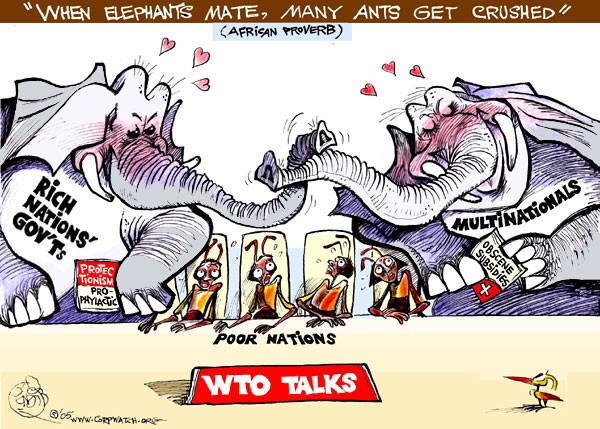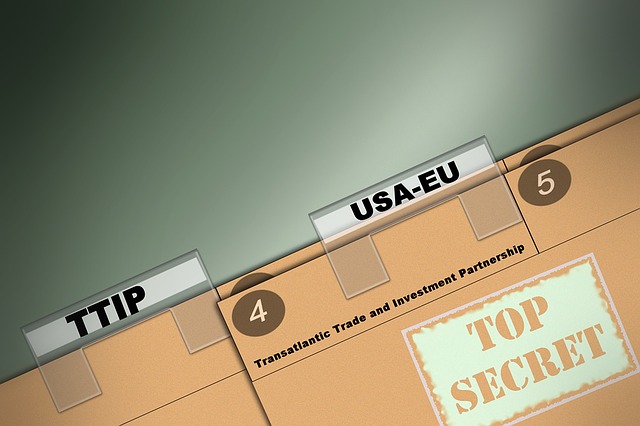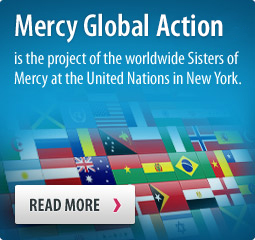
Does the TTIP trade agreement matter to us......
General: June 13, 2016
Free trade is usually defined as the absence of tariffs and quotas, allowing each country to specialize in the goods it can produce cheaply and efficiently relative to other countries. Trade agreements can affect a huge range of laws and programmes that determine how our economies work, how we grow and sell food and who benefits – or loses.

Cartoon:Khalil Bendib. Used under licence
In the 1990s, the World Trade Organisation (WTO) was formed to harmonise cross-border regulations on everything from cars to pharmaceuticals and to cut tariffs in order to promote the free flow of goods and services around the world. While Trade agreements were seen as a panacea for global poverty, there was always a fear that lower tariffs would favour the rich and powerful while crucifying small producers struggling to compete in an unprotected environment.
An example of how this worked was the implementation of the North American Free Trade Agreement (NAFTA) signed by the US, Mexico and Canada in 1993. Since the implementation of NAFTA, displacement of production has resulted in the loss of 879,280 jobs in the US while Mexican workers were subjected to low wages and poor working conditions. Most of the US job losses were high-wage positions in manufacturing industries. NAFTA also contributed to raising income inequality, suppressing real wages for production workers, weakening workers’ collective bargaining powers and ability to organize unions, and reducing fringe benefits.
This year the trading blocks of the US and Europe hope to sign what many believe will be NAFTA’S direct successor –TTIP (The Trans-Atlantic Trade and Investment Partnership). TTIP is an agreement currently under negotiation between the European Union (EU) and the USA, it is the most ambitious trade deal in modern history, given that these two trading blocks together account for half of the world’s GDP and a third of global trade. It is being negotiated by the European Commission on behalf of the EU’s 28 member countries. The deal aims to lower the cost of imports and boost exports by:
- Removing goods tariffs and securing access to new markets, including lucrative government contracts;
- aligning regulations in nine sectors, including food, chemicals, cosmetics, and computers;
- agreeing new rules to protect workers, the environment, investors, small companies and intellectual property rights
On the surface it looks encouraging– aiming to make trade easier between the two regions – but underneath lies a range of worrying clauses that would undermine democratic rights and human rights as evidenced here:
1. False Promises on Jobs
Proponents of TTIP claim that this trade deal will bring jobs and growth. Initial studies suggested that more than a million jobs could be created as a result of TTIP, but newly released studies indicate that up to 600,000 will be lost in the EU. The cost to hard-fought labour rights in Europe could be substantial, and would likely result in decreased job security, wage reductions and a further loss of jobs leading to greater market instability.
2. Increases in CO2 Emissions
The world has recently made huge progress at the UN Climate Change talks in Paris in agreeing a plan to reduce our global emissions to curtail climate change. TTIP threatens this progress as the most ambitious TTIP scenario predicts an increase of 11.8 million tonnes of CO2 emissions. The increase in emissions, when multiplied by estimates of the social cost of carbon, would cost the European Union US$ 1.4 billion annually. The current model that the TTIP is based on will increase carbon dioxide emissions and jeopardize the ability of Europe and the United States to put in place effective policies for mitigating climate change. Trade and investment treaties should be used to help achieve the broader climate change objectives of Europe and the United States, not hinder them.
3. Dispute resolution
A little known facet of every trade deal is that it includes a separate form of arbitration for businesses allowing them to avoid national civil courts. The investor-state dispute resolution (ISDS) gives foreign investors the power to sue a government for introducing legislation that harms their investment. ISDS is a private court held outside of the normal judicial system for foreign companies to sue the government if they feel new government policy will affect their profits. This could be anything from an increase in the minimum wage to environmental protection. Multi-national companies in conjunction with governments, often behind closed doors, lock these decisions into permanent agreements that in many cases override national and international laws.
This ‘investor-state dispute settlement’ mechanism, (ISDS) threatens to undermine the most basic principles of democracy, as previous cases from other treaties show;
- Dutch firm Achmea successfully sued the new government of Slovakia for reversing an unpopular health privatisation scheme.
- US tobacco giant Philip Morris is suing the Australian government for billions of dollars for demanding all cigarettes be sold in plain packaging.
- Swedish company Vattenfall is suing the German government for €5bn over its decision to phase out nuclear power by 2022.
- Veolia is suing the Egyptian government for loss of profits as a result of the country’s decision to raise the minimum wage.
- US company Lone Pine is suing Canada for the ban on fracking in Quebec.
The number of suits filed against countries is now around 500 – and that figure is growing at an average rate of one case a week.
Winners and Losers
The winners in TTIP are corporations, not consumers, or workers, or farmers. Many organisations representing diverse groups within society e.g. farmers, health organisations, trade unions are against TTIP because of the negative impacts they can see for people’s health, democratic rights and environmental protection. So far, 3.5 million people across Europe have signed a petition to stop the TTIP trade agreement going through.
Opponents say the deal falls down on health, environmental and democratic grounds, with opposition strongest in Germany, Austria and France. They claim that the deal will lower EU food safety and environmental standards, flooding the bloc with genetically modified vegetables, hormone-treated beef and fracked shale gas. Groups including health organisations, food critics and NGOs are concerned that the quality and standard of food would be negatively affected by TTIP as food standards in the EU are much higher than US. For instance, the EU has banned chlorine-washed chicken and hormone-treated beef, while the US is more lenient, certifying it as long as it’s labelled accordingly. European trade chief Cecilia Malmström insists that the EU operates according to the “precautionary principle” which means the EU regulates to prevent potential risks to human, animal or plant health prior to supply rather than removing products from the market after the fact.
Supporters of TTIP quote a 2013 paper by the London-based Centre for Economy Policy Research (CEPR), which says the EU economy will grow by €119bn a year, which translates into 0.5% of GDP or an extra €545 for every household. A 2015 study by the Swiss-based World Trade Institute says the deal will push consumer prices down by 0.9% in most EU countries and average wages up by 0.5% across the bloc.
Recent Developments
In May 2016, climate campaigners Greenpeace leaked almost 250 pages of TTIP negotiating texts stirring up opposition against TTIP particularly in Germany and France. This combined with the recent push by the US to sign the deal before their November elections has stirred up latent resentment across Europe. The documents show that US corporations will be granted unprecedented powers over any new public health or safety regulations to be introduced in the future. If any European government does dare to bring in laws to raise social or environmental standards, TTIP will grant US investors the right to sue for loss of future profits.
The leaked documents, include highly controversial subjects such as EU food safety standards, already known to be at risk from TTIP, as well as details of specific threats such as the US plan to end Europe’s ban on genetically modified foods. These documents also reveal that US corporations will be granted unprecedented powers over any new public health or safety regulations to be introduced in the future. If any European government does dare to bring in laws to raise social or environmental standards, TTIP will grant US investors the right to sue for loss of profits in their own corporate court system that is inaccessible to domestic firms, governments or anyone else.
The leaked texts also reveal how the European Commission is preparing to open up the European economy to unfair competition from giant US corporations, despite acknowledging the disastrous consequences this will bring to European producers, who have to meet far higher standards than exist in the USA.

The Future
If passed, TTIP could become the blueprint for future trade agreements worldwide, meaning its negative effects could be even worse for countries in the Global South. There are already existing, significant power imbalances especially in the Global South, though not exclusively. These power imbalances would become even more deeply entrenched if core elements of TTIP, such as ISDS are not challenged and overcome.
The more people learn about TTIP, the more outraged they become, so it seems that trade agreements do mean a lot to us. They threaten our democracy, economy, traditions, environment, food and health. We need to join the 3.5 million people who have already petitioned to stop the trade agreement going through as it stands.
What You Can Do
- Join Anti TTIP groups in your region
- If there are no groups in your area, start your own!
- Spread the word about the threats surrounding TTIP
- Keep up to date on the progress of TTIP and share this news
Messages to: Betty Lacey - MGA Researcher




